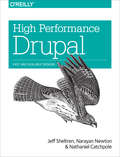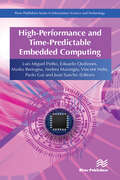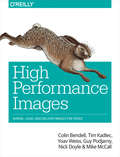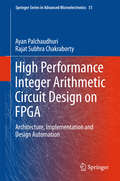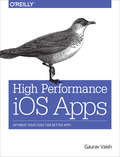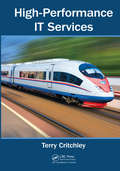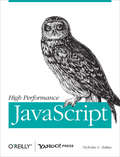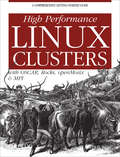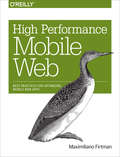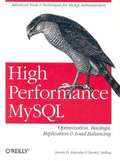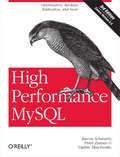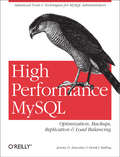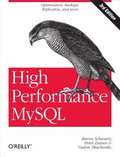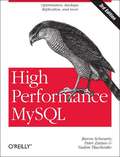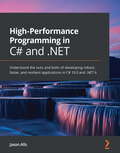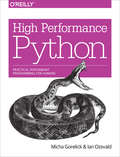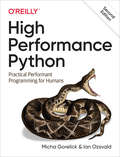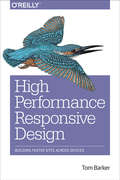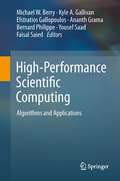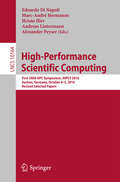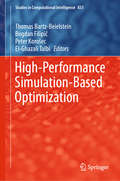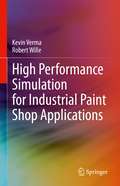- Table View
- List View
High Performance Drupal: Fast and Scalable Designs
by Nathaniel Catchpole Jeff Sheltren Narayan NewtonHow can you help your Drupal website continue to perform at the highest level as it grows to meet demand? This comprehensive guide provides best practices, examples, and in-depth explanations for solving several performance and scalability issues. You'll learn how to apply coding and infrastructure techniques to Drupal internals, application performance, databases, web servers, and performance analysis. Covering Drupal versions 7 and 8, this book is the ideal reference for everything from site deployment to implementing specific technologies such as Varnish, memcache, or Solr. If you have a basic understanding of Drupal and the Linux-Apache-MySQL-PHP (LAMP) stack, you're ready to get started. Establish a performance baseline and define goals for improvement Optimize your website's code and front-end performance Get best and worst practices for customizing Drupal core functionality Apply infrastructure design techniques to launch or expand a site Use tools to configure, monitor, and optimize MySQL performance Employ alternative storage and backend search options as your site grows Tune your web servers through httpd and PHP configuration Monitor services and perform load tests to catch problems before they become critical
High Performance Embedded Computing
by Luís Miguel Pinho Eduardo Quiñones Marko Bertogna Andrea Marongiu Vincent Nélis Paolo Gai Juan SanchoNowadays, the prevalence of computing systems in our lives is so ubiquitous that we live in a cyber-physical world dominated by computer systems, from pacemakers to cars and airplanes. These systems demand for more computational performance to process large amounts of data from multiple data sources with guaranteed processing times. Actuating outside of the required timing bounds may cause the failure of the system, being vital for systems like planes, cars, business monitoring, e-trading, etc. High-Performance and Time-Predictable Embedded Computing presents recent advances in software architecture and tools to support such complex systems, enabling the design of embedded computing devices which are able to deliver high-performance whilst guaranteeing the application required timing bounds. Technical topics discussed in the book include: Parallel embedded platforms Programming models Mapping and scheduling of parallel computations Timing and schedulability analysis Runtimes and operating systemsThe work reflected in this book was done in the scope of the European project P SOCRATES, funded under the FP7 framework program of the European Commission. High-performance and time-predictable embedded computing is ideal for personnel in computer/communication/embedded industries as well as academic staff and master/research students in computer science, embedded systems, cyber-physical systems and internet-of-things.
High Performance Images: Shrink, Load, and Deliver Images for Speed
by Colin Bendell Guy Podjarny Mike Mccall Nick Doyle Tim Kadlec Yoav WeissHigh-quality images have an amazing power of attraction. Just add some stunning photos and graphics to your website or app and watch your user engagement and conversion numbers climb. It can be tricky, but with this practical guide, you’ll master the many facets of delivering high performance images on the internet—without adversely affecting site performance.You’ll learn the nuts and bolts of color theory, image formats, storage and management, operations delivery, browser and application behavior, the responsive web, and many other topics. Ideal for developers, this book also provides useful tips, tricks, and practical theory for processing and displaying powerful images that won’t slow down your online product.Explore digital image theory and the different formats availableDive into JPEGs, SVG and vector images, lossless compression, and other formatsUse techniques for downloading and rendering images in a browser, and for loading images on mobile devices and cellular networksExamine specific rendering techniques, such as lazy loading, image processing, image consolidation, and responsive imagesTake responsive images to the next level by using content negotiation between browser and server with the Client Hints HTTP standardLearn how to operationalize your image workflowContributors include Colin Bendell, Tim Kadlec, Yoav Weiss, Guy Podjarny, Nick Doyle, and Mike McCall from Akamai Technologies.
High Performance Integer Arithmetic Circuit Design on FPGA
by Ayan Palchaudhuri Rajat Subhra ChakrabortyThis book describes the optimized implementations of several arithmetic datapath, controlpath and pseudorandom sequence generator circuits for realization of high performance arithmetic circuits targeted towards a specific family of the high-end Field Programmable Gate Arrays (FPGAs). It explores regular, modular, cascadable and bit-sliced architectures of these circuits, by directly instantiating the target FPGA-specific primitives in the HDL. Every proposed architecture is justified with detailed mathematical analyses. Simultaneously, constrained placement of the circuit building blocks is performed, by placing the logically related hardware primitives in close proximity to one another by supplying relevant placement constraints in the Xilinx proprietary "User Constraints File". The book covers the implementation of a GUI-based CAD tool named FlexiCore integrated with the Xilinx Integrated Software Environment (ISE) for design automation of platform-specific high-performance arithmetic circuits from user-level specifications. This tool has been used to implement the proposed circuits, as well as hardware implementations of integer arithmetic algorithms where several of the proposed circuits are used as building blocks. Implementation results demonstrate higher performance and superior operand-width scalability for the proposed circuits, with respect to implementations derived through other existing approaches. This book will prove useful to researchers, students and professionals engaged in the domain of FPGA circuit optimization and implementation.
High Performance iOS Apps: Optimize Your Code for Better Apps
by Gaurav VaishReady to build mobile apps that out-perform the rest? If you're an iOS developer with app-building experience, this practical guide provides tips and best practices to help you solve many common performance issues. You'll learn how to design and optimize iOS apps that deliver a smooth experience even when the network is poor and memory is low.Today's picky users want fast and responsive apps that don't hog resources. In this book, author Gaurav Vaish demonstrates methods for writing optimal code from an engineering perspective, using reusable Objective-C code that you can use right away. Up your game and create high-performance native iOS apps that truly stand out from the crowd.Measure key performance indicators--attributes that constitute and affect app performanceWrite efficient apps by minimizing memory and power consumption, and explore options for using available CPU coresOptimize your app's lifecycle and UI, as well as its networking, data sharing, and security featuresLearn about application testing, debugging and analysis tools, and monitoring your app in the wildCollect data from real users to analyze app usage, identify bottlenecks, and provide fixesUse iOS 9 upgrades to improve your app's performance
High-Performance IT Services
by Terry CritchleyThis book on performance fundamentals covers UNIX, OpenVMS, Linux, Windows, and MVS. Most of the theory and systems design principles can be applied to other operating systems, as can some of the benchmarks. The book equips professionals with the ability to assess performance characteristics in unfamiliar environments. It is suitable for practitioners, especially those whose responsibilities include performance management, tuning, and capacity planning. IT managers with a technical outlook also benefit from the book as well as consultants and students in the world of systems for the first time in a professional capacity.
High Performance JavaScript: Build Faster Web Application Interfaces
by Nicholas C. ZakasIf you're like most developers, you rely heavily on JavaScript to build interactive and quick-responding web applications. The problem is that all of those lines of JavaScript code can slow down your apps. This book reveals techniques and strategies to help you eliminate performance bottlenecks during development. You'll learn how to improve execution time, downloading, interaction with the DOM, page life cycle, and more. Yahoo! frontend engineer Nicholas C. Zakas and five other JavaScript experts -- Ross Harmes, Julien Lecomte, Steven Levithan, Stoyan Stefanov, and Matt Sweeney -- demonstrate optimal ways to load code onto a page, and offer programming tips to help your JavaScript run as efficiently and quickly as possible. You'll learn the best practices to build and deploy your files to a production environment, and tools that can help you find problems once your site goes live. Identify problem code and use faster alternatives to accomplish the same task Improve scripts by learning how JavaScript stores and accesses data Implement JavaScript code so that it doesn't slow down interaction with the DOM Use optimization techniques to improve runtime performance Learn ways to ensure the UI is responsive at all times Achieve faster client-server communication Use a build system to minify files, and HTTP compression to deliver them to the browser
High Performance Linux Clusters with OSCAR, Rocks, OpenMosix, and MPI
by Joseph D SloanTo the outside world, a "supercomputer" appears to be a single system. In fact, it's a cluster of computers that share a local area network and have the ability to work together on a single problem as a team. Many businesses used to consider supercomputing beyond the reach of their budgets, but new Linux applications have made high-performance clusters more affordable than ever. These days, the promise of low-cost supercomputing is one of the main reasons many businesses choose Linux over other operating systems. This new guide covers everything a newcomer to clustering will need to plan, build, and deploy a high-performance Linux cluster. The book focuses on clustering for high-performance computation, although much of its information also applies to clustering for high-availability (failover and disaster recovery). The book discusses the key tools you'll need to get started, including good practices to use while exploring the tools and growing a system. You'll learn about planning, hardware choices, bulk installation of Linux on multiple systems, and other basic considerations. Then, you'll learn about software options that can save you hours--or even weeks--of deployment time. Since a wide variety of options exist in each area of clustering software, the author discusses the pros and cons of the major free software projects and chooses those that are most likely to be helpful to new cluster administrators and programmers. A few of the projects introduced in the book include: MPI, the most popular programming library for clusters. This book offers simple but realistic introductory examples along with some pointers for advanced use. OSCAR and Rocks, two comprehensive installation and administrative systems openMosix (a convenient tool for distributing jobs), Linux kernel extensions that migrate processes transparently for load balancing PVFS, one of the parallel filesystems that make clustering I/O easier C3, a set of commands for administering multiple systems Ganglia, OpenPBS, and cloning tools (Kickstart, SIS and G4U) are also covered. The book looks at cluster installation packages (OSCAR & Rocks) and then considers the core packages individually for greater depth or for folks wishing to do a custom installation. Guidelines for debugging, profiling, performance tuning, and managing jobs from multiple users round out this immensely useful book.
High Performance Mobile Web: Best Practices for Optimizing Mobile Web Apps
by Maximiliano FirtmanOptimize the performance of your mobile websites and webapps to the extreme. With this hands-on book, veteran mobile and web developer Maximiliano Firtman demonstrates which aspects of your site or app slow down the user's experience, and what you can do to achieve lightning-fast performance. There's much at stake: if you want to boost your app's conversion rate, then tackling performance issues is the best way to start.Learn tools and techniques for working with responsive web design, images, the network layer, and many other ingredients--plus the metrics to check your progress. Ideal for web developers and web designers with HTML, CSS, JavaScript, and HTTP experience, this is your guide to superior mobile web performance.You'll dive into:Emulators, simulators, and other tools for measuring performanceBasic web performance concepts, including metrics, charts, and goalsHow to get real data from mobile browsers on your real networksAPIs and specs for measuring, tracking and improving web performanceInsights and tricks for optimizing the first view experienceWays to optimize post-loading experiences and future visitsResponsive web design and its performance challengesTips for extreme performance to achieve best conversion ratesHow to work with web views inside native apps
High Performance MySQL
by Derek J. Balling Baron Schwartz Peter Zaitsev Vadim Tkachenko Jeremy Zawodny Arjen LentzHigh Performance MySQL is the definitive guide to building fast, reliable systems with MySQL. Written by noted experts with years of real-world experience building very large systems, this book covers every aspect of MySQL performance in detail, and focuses on robustness, security, and data integrity. High Performance MySQL teaches you advanced techniques in depth so you can bring out MySQL's full power. Learn how to design schemas, indexes, queries and advanced MySQL features for maximum performance, and get detailed guidance for tuning your MySQL server, operating system, and hardware to their fullest potential. You'll also learn practical, safe, high-performance ways to scale your applications with replication, load balancing, high availability, and failover. This second edition is completely revised and greatly expanded, with deeper coverage in all areas. Major additions include: * Emphasis throughout on both performance and reliability * Thorough coverage of storage engines, including in-depth tuning and optimizations for the InnoDB storage engine * Effects of new features in MySQL 5.0 and 5.1, including stored procedures, partitioned databases, triggers, and views * A detailed discussion on how to build very large, highly scalable systems with MySQL * New options for backups and replication * Optimization of advanced querying features, such as full-text searches * Four new appendices The book also includes chapters on benchmarking, profiling, backups, security, and tools and techniques to help you measure, monitor, and manage your MySQL installations.
High Performance MySQL
by Derek J. Balling Jeremy ZawodnyIn High Performance MySQL you will learn about MySQL indexing and optimization in depth so you can make better use of these key features. You will learn practical replication, backup, and load-balancing strategies with information that goes beyond available tools to discuss their effects in real-life environments. And you'll learn the supporting techniques you need to carry out these tasks, including advanced configuration, benchmarking, and investigating logs.
High Performance MySQL
by Baron Schwartz Peter Zaitsev Vadim Tkachenko<p><i>High Performance MySQL</i> teaches you advanced techniques in depth so you can bring out MySQL's full power. Learn how to design schemas, indexes, queries, and advanced MySQL features for maximum performance, and get detailed guidance for tuning your MySQL server, operating system, and hardware to their fullest potential. You'll also learn practical, safe, high-performance ways to scale your applications with replication, load balancing, high availability, and failover.</p>
High Performance MySQL: Optimization, Backups, and Replication
by Baron Schwartz Peter Zaitsev Vadim TkachenkoHow can you bring out MySQL’s full power? With High Performance MySQL, you’ll learn advanced techniques for everything from designing schemas, indexes, and queries to tuning your MySQL server, operating system, and hardware to their fullest potential. This guide also teaches you safe and practical ways to scale applications through replication, load balancing, high availability, and failover.Updated to reflect recent advances in MySQL and InnoDB performance, features, and tools, this third edition not only offers specific examples of how MySQL works, it also teaches you why this system works as it does, with illustrative stories and case studies that demonstrate MySQL’s principles in action. With this book, you’ll learn how to think in MySQL.Learn the effects of new features in MySQL 5.5, including stored procedures, partitioned databases, triggers, and viewsImplement improvements in replication, high availability, and clusteringAchieve high performance when running MySQL in the cloudOptimize advanced querying features, such as full-text searchesTake advantage of modern multi-core CPUs and solid-state disksExplore backup and recovery strategies—including new tools for hot online backups
High Performance MySQL
by Jeremy D. Zawodny Derek J. BallingAs users come to depend on MySQL, they find that they have to deal with issues of reliability, scalability, and performance--issues that are not well documented but are critical to a smoothly functioning site. This book is an insider's guide to these little understood topics. Author Jeremy Zawodny has managed large numbers of MySQL servers for mission-critical work at Yahoo!, maintained years of contacts with the MySQL AB team, and presents regularly at conferences. Jeremy and Derek have spent months experimenting, interviewing major users of MySQL, talking to MySQL AB, benchmarking, and writing some of their own tools in order to produce the information in this book. In High Performance MySQL you will learn about MySQL indexing and optimization in depth so you can make better use of these key features. You will learn practical replication, backup, and load-balancing strategies with information that goes beyond available tools to discuss their effects in real-life environments. And you'll learn the supporting techniques you need to carry out these tasks, including advanced configuration, benchmarking, and investigating logs. Topics include:A review of configuration and setup options Storage engines and table types Benchmarking Indexes Query Optimization Application Design Server Performance Replication Load-balancing Backup and Recovery Security
High Performance MySQL
by Jeremy D. Zawodny Vadim Tkachenko Baron Schwartz Derek J. Balling Peter Zaitsev Arjen LentzHigh Performance MySQL is the definitive guide to building fast, reliable systems with MySQL. Written by noted experts with years of real-world experience building very large systems, this book covers every aspect of MySQL performance in detail, and focuses on robustness, security, and data integrity.High Performance MySQL teaches you advanced techniques in depth so you can bring out MySQL's full power. Learn how to design schemas, indexes, queries and advanced MySQL features for maximum performance, and get detailed guidance for tuning your MySQL server, operating system, and hardware to their fullest potential. You'll also learn practical, safe, high-performance ways to scale your applications with replication, load balancing, high availability, and failover. This second edition is completely revised and greatly expanded, with deeper coverage in all areas. Major additions include:Emphasis throughout on both performance and reliability Thorough coverage of storage engines, including in-depth tuning and optimizations for the InnoDB storage engine Effects of new features in MySQL 5.0 and 5.1, including stored procedures, partitioned databases, triggers, and views A detailed discussion on how to build very large, highly scalable systems with MySQL New options for backups and replication Optimization of advanced querying features, such as full-text searches Four new appendices The book also includes chapters on benchmarking, profiling, backups, security, and tools and techniques to help you measure, monitor, and manage your MySQL installations.
High Performance MySQL, 2nd Edition
by Baron Schwartz Peter Zaitsev Vadim Tkachenko Jeremy ZawodnyHigh Performance MySQL is the definitive guide to building fast, reliable systems with MySQL. Written by noted experts with years of real-world experience building very large systems, this book covers every aspect of MySQL performance in detail, and focuses on robustness, security, and data integrity. High Performance MySQL teaches you advanced techniques in depth so you can bring out MySQL's full power. Learn how to design schemas, indexes, queries and advanced MySQL features for maximum performance, and get detailed guidance for tuning your MySQL server, operating system, and hardware to their fullest potential. You'll also learn practical, safe, high-performance ways to scale your applications with replication, load balancing, high availability, and failover. This second edition is completely revised and greatly expanded, with deeper coverage in all areas. Major additions include: * Emphasis throughout on both performance and reliability * Thorough coverage of storage engines, including in-depth tuning and optimizations for the InnoDB storage engine * Effects of new features in MySQL 5.0 and 5.1, including stored procedures, partitioned databases, triggers, and views * A detailed discussion on how to build very large, highly scalable systems with MySQL * New options for backups and replication * Optimization of advanced querying features, such as full-text searches * Four new appendices The book also includes chapters on benchmarking, profiling, backups, security, and tools and techniques to help you measure, monitor, and manage your MySQL installations.
High Performance MySQL, 2nd Edition
by Baron Schwartz Peter Zaitsev Vadim Tkachenko Jeremy Zawodny Arjen Lentz Derek J. BallingHigh Performance MySQL is the definitive guide to building fast, reliable systems with MySQL. Written by noted experts with years of real-world experience building very large systems, this book covers every aspect of MySQL performance in detail, and focuses on robustness, security, and data integrity. High Performance MySQL teaches you advanced techniques in depth so you can bring out MySQL's full power. Learn how to design schemas, indexes, queries and advanced MySQL features for maximum performance, and get detailed guidance for tuning your MySQL server, operating system, and hardware to their fullest potential. You'll also learn practical, safe, high-performance ways to scale your applications with replication, load balancing, high availability, and failover. This second edition is completely revised and greatly expanded, with deeper coverage in all areas. Major additions include: Emphasis throughout on both performance and reliability Thorough coverage of storage engines, including in-depth tuning and optimizations for the InnoDB storage engine Effects of new features in MySQL 5.0 and 5.1, including stored procedures, partitioned databases, triggers, and views A detailed discussion on how to build very large, highly scalable systems with MySQL New options for backups and replication Optimization of advanced querying features, such as full-text searches Four new appendices The book also includes chapters on benchmarking, profiling, backups, security, and tools and techniques to help you measure, monitor, and manage your MySQL installations.
High-Performance Programming in C# and .NET: Understand the nuts and bolts of developing robust, faster, and resilient applications in C# 10.0 and .NET 6
by Jason AllsEnhance your applications' performance using best practices for benchmarking, application profiling, asynchronous programming, designing responsive UIs, gRPC communication, and distributed applicationsKey FeaturesMake the best use of performance enhancements in C# 10.0 and .NET 6Boost application performance by identifying hardware bottlenecks and common performance pitfallsGet to grips with best practices and techniques for improving the scalability of distributed systemsBook DescriptionWriting high-performance code while building an application is crucial, and over the years, Microsoft has focused on delivering various performance-related improvements within the .NET ecosystem. This book will help you understand the aspects involved in designing responsive, resilient, and high-performance applications with the new version of C# and .NET.You will start by understanding the foundation of high-performance code and the latest performance-related improvements in C# 10.0 and .NET 6. Next, you'll learn how to use tracing and diagnostics to track down performance issues and the cause of memory leaks. The chapters that follow then show you how to enhance the performance of your networked applications and various ways to improve directory tasks, file tasks, and more. Later, you'll go on to improve data querying performance and write responsive user interfaces. You'll also discover how you can use cloud providers such as Microsoft Azure to build scalable distributed solutions. Finally, you'll explore various ways to process code synchronously, asynchronously, and in parallel to reduce the time it takes to process a series of tasks.By the end of this C# programming book, you'll have the confidence you need to build highly resilient, high-performance applications that meet your customer's demands.What you will learnUse correct types and collections to enhance application performanceProfile, benchmark, and identify performance issues with the codebaseExplore how to best perform queries on LINQ to improve an application's performanceEffectively utilize a number of CPUs and cores through asynchronous programmingBuild responsive user interfaces with WinForms, WPF, MAUI, and WinUIBenchmark ADO.NET, Entity Framework Core, and Dapper for data accessImplement CQRS and event sourcing and build and deploy microservicesWho this book is forThis book is for software engineers, professional software developers, performance engineers, and application profilers looking to improve the speed of their code or take their skills to the next level to gain a competitive advantage. You should be a proficient C# programmer who can already put the language to good use and is also comfortable using Microsoft Visual Studio 2022.
High Performance Python
by Micha Gorelick Ian OzsvaldYour Python code may run correctly, but you need it to run faster. By exploring the fundamental theory behind design choices, this practical guide helps you gain a deeper understanding of Python's implementation. You'll learn how to locate performance bottlenecks and significantly speed up your code in high-data-volume programs.How can you take advantage of multi-core architectures or clusters? Or build a system that can scale up and down without losing reliability? Experienced Python programmers will learn concrete solutions to these and other issues, along with war stories from companies that use high performance Python for social media analytics, productionized machine learning, and other situations.Get a better grasp of numpy, Cython, and profilersLearn how Python abstracts the underlying computer architectureUse profiling to find bottlenecks in CPU time and memory usageWrite efficient programs by choosing appropriate data structuresSpeed up matrix and vector computationsUse tools to compile Python down to machine codeManage multiple I/O and computational operations concurrentlyConvert multiprocessing code to run on a local or remote clusterSolve large problems while using less RAM
High Performance Python: Practical Performant Programming for Humans
by Micha Gorelick Ian OzsvaldYour Python code may run correctly, but you need it to run faster. Updated for Python 3, this expanded edition shows you how to locate performance bottlenecks and significantly speed up your code in high-data-volume programs. By exploring the fundamental theory behind design choices, High Performance Python helps you gain a deeper understanding of Python’s implementation.How do you take advantage of multicore architectures or clusters? Or build a system that scales up and down without losing reliability? Experienced Python programmers will learn concrete solutions to many issues, along with war stories from companies that use high-performance Python for social media analytics, productionized machine learning, and more.Get a better grasp of NumPy, Cython, and profilersLearn how Python abstracts the underlying computer architectureUse profiling to find bottlenecks in CPU time and memory usageWrite efficient programs by choosing appropriate data structuresSpeed up matrix and vector computationsUse tools to compile Python down to machine codeManage multiple I/O and computational operations concurrentlyConvert multiprocessing code to run on local or remote clustersDeploy code faster using tools like Docker
High Performance Responsive Design: Building Faster Sites Across Devices
by Tom BarkerYes, you can use responsive web design to create high performance, compelling websites. With this practical book, author Tom Barker demonstrates that responsive design is not just a frontend-only approach, but also a philosophy for taking advantage of the entire web stack. Responsive design patterns and anti-patterns, derived from heavily used real-world sites, are guiding principles throughout the book.Ideal for frontend-focused web developers, this book shows you how to incorporate responsiveness and performance into your project plan, use Node.js for device-specific functionality on the backend, and write automated tests for a continuous integration environment. You'll explore many useful tools and responsive frameworks, and gain useful insights from Barker's own experience with responsive design along the way.Get a primer on web performance concepts, web runtime performance, and performance tracking toolsWrite functionality with Node.js that serves up a device-specific experience to the clientExplore client-side solutions, such as lazy loading entire sections of a page--including images, styling, and contentValidate service level agreements (SLAs) by writing automated tests with PhantomJSExamine several responsive frameworks, including the author's server-side framework, Ripple
High-Performance Scientific Computing
by Kyle A. Gallivan Ananth Grama Faisal Saied Bernard Philippe Efstratios Gallopoulos Michael W. Berry Yousef SaadThis book presents the state of the art in parallel numerical algorithms, applications, architectures, and system software. The book examines various solutions for issues of concurrency, scale, energy efficiency, and programmability, which are discussed in the context of a diverse range of applications. Features: includes contributions from an international selection of world-class authorities; examines parallel algorithm-architecture interaction through issues of computational capacity-based codesign and automatic restructuring of programs using compilation techniques; reviews emerging applications of numerical methods in information retrieval and data mining; discusses the latest issues in dense and sparse matrix computations for modern high-performance systems, multicores, manycores and GPUs, and several perspectives on the Spike family of algorithms for solving linear systems; presents outstanding challenges and developing technologies, and puts these in their historical context.
High-Performance Scientific Computing
by Marc-André Hermanns Hristo Iliev Andreas Lintermann Alexander Peyser Edoardo Di NapoliThis book constitutes the thoroughly refereed post-conference proceedings of the First JARA High-Performance Computing Symposium, JARA-HPC 2016, held in Aachen, Germany, in October 2016.The 21 full papers presented were carefully reviewed and selected from 26 submissions. They cover many diverse topics, such as coupling methods and strategies in Computational Fluid Dynamics (CFD), performance portability and applications in HPC, as well as provenance tracking for large-scale simulations.
High-Performance Simulation-Based Optimization (Studies in Computational Intelligence #833)
by Thomas Bartz-Beielstein Bogdan Filipič Peter Korošec El-Ghazali TalbiThis book presents the state of the art in designing high-performance algorithms that combine simulation and optimization in order to solve complex optimization problems in science and industry, problems that involve time-consuming simulations and expensive multi-objective function evaluations. As traditional optimization approaches are not applicable per se, combinations of computational intelligence, machine learning, and high-performance computing methods are popular solutions. But finding a suitable method is a challenging task, because numerous approaches have been proposed in this highly dynamic field of research. That’s where this book comes in: It covers both theory and practice, drawing on the real-world insights gained by the contributing authors, all of whom are leading researchers. Given its scope, if offers a comprehensive reference guide for researchers, practitioners, and advanced-level students interested in using computational intelligence and machine learning to solve expensive optimization problems.
High Performance Simulation for Industrial Paint Shop Applications
by Kevin Verma Robert WilleThis book describes the current state of the art for simulating paint shop applications, their advantages and limitations, as well as corresponding high-performance computing (HPC) methods utilized in this domain. The authors provide a comprehensive introduction to fluid simulations, corresponding optimization methods from the HPC domain, as well as industrial paint shop applications. They showcase how the complexity of these applications bring corresponding fluid simulation methods to their limits and how these shortcomings can be overcome by employing HPC methods. To that end, this book covers various optimization techniques for three individual fluid simulation techniques, namely grid-based methods, volumetric decomposition methods, and particle-based methods.
